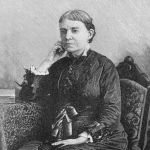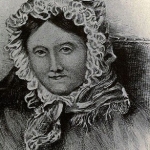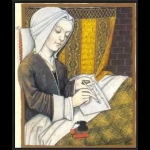I tell thee, Dick, where I have been,
Where I the rarest things have seen;
Oh, things without compare!
Such sights again cannot be found
In any place on english ground,
Be it at wake, or fair.
At Charing-Cross, hard by the way,
Where we (thou know’st) do sell our hay,
There is a house with stairs;
And there did I see coming down
Such folk as are not in our town,
Vorty, at least, in pairs.
Amongst the rest, one pest’lent fine
(His beard no bigger though than thine)
Walk’d on before the rest:
Our landlord looks like nothing to him:
The King (God bless him) ’twould undo him,
Should he go still so drest.
At Course-a-Park, without all doubt,
He should have first been taken out
By all the maids i’th’ town:
Though lusty Roger there had been,
Or little George upon the Green,
Or Vincent of the Crown.
But wot you what? the youth was going
To make an end of all his wooing;
The parson for him stay’d:
Yet by his leave (for all his haste),
He did not so much wish all past
(Perchance), as did the maid.
The maid (and thereby hangs a tale)
For such a maid no Whitsun-ale
Could ever yet produce:
No grape, that’s kindly ripe, could be
So round, so plump, so soft as she,
Nor half so full of juice.
Her finger was so small, the ring
Would not stay on, which they did bring;
It was too wide a peck:
And to say truth (for out it must)
It look’d like the great collar (just)
About our young colt’s neck.
Her feet beneath her petticoat,
Like little mice, stole in and out,
As if they fear’d the light:
But oh! she dances such a way
No sun upon an Easter-day
Is half so fine a sight.
He would have kissed her once or twice,
But she would not, she was nice,
She would not do’t in sight,
And then she looked as who should say
I will do what I list to day;
And you shall do’t at night.
Her cheeks so rare a white was on,
No daisy makes comparison,
(Who sees them is undone);
For streaks of red were mingled there,
Such as are on a Catherine pear
(The side that’s next the sun).
Her lips were red, and one was thin,
Compar’d to that was next her chin;
(Some bee had stung it newly);
But (Dick) her eyes so guard her face,
I durst no more upon them gaze
Than on the sun in July.
Her mouth so small, when she does speak,
Thou’dst swear her teeth her words did break,
That they might passage get;
But she so handled still the matter,
They came as good as ours, or better,
And are not spent a whit.
If wishing should be any sin,
The Parson himself had guilty been;
(She looked that day so purely,)
And did the youth so oft the feat
At night, as some did in conceit,
It would have spoil’d him, surely.
Passion o’ me, how I run on!
There’s that that would be thought upon
(I trow) besides the bride.
The business of the kitchen’s great,
For it is fit that men should eat;
Nor was it there denied.
Just in the nick the cook knock’d thrice,
And all the waiters in a trice
His summons did obey:
Each serving-man, with dish in hand,
March’d boldly up, like our train’d band,
Presented, and away.
When all the meat was on the table,
What man of knife or teeth was able
To stay to be intreated?
And this the very reason was,
Before the parson could say grace,
The company was seated.
Now hats fly off, and youths carouse,
Healths first go round, and then the house,
The bride’s came thick and thick;
And when ’twas nam’d another’s health,
Perhaps he made it hers by stealth;
And who could help it, Dick?
O’ th’ sudden up they rise and dance;
Then sit again and sigh, and glance;
Then dance again and kiss:
Thus sev’ral ways the time did pass,
Whilst ev’ry woman wish’d her place,
And ev’ry man wish’d his.
By this time all were stol’n aside
To counsel and undress the Bride;
But that he must not know:
But yet ’twas thought he guess’d her mind,
And did not mean to stay behind
Above an hour or so.
When in he came (Dick) there she lay
Like new-fal’n snow melting away,
(’Twas time I trow to part)
Kisses were now the only stay,
Which soon she gave, as who would say,
Good Boy! with all my heart.
But just as heav’ns would have to cross it,
In came the Bridemaids with the Posset:
The Bridegroom eat in spite;
For had he left the Women to’t
It would have cost two hours to do’t,
Which were too much that night.
At length the candles out and out,
All that they had not done, they do’t:
What that is, who can tell?
But I believe it was no more
Then thou and I have done before
With Bridget, and with Nell.



















Comment form: